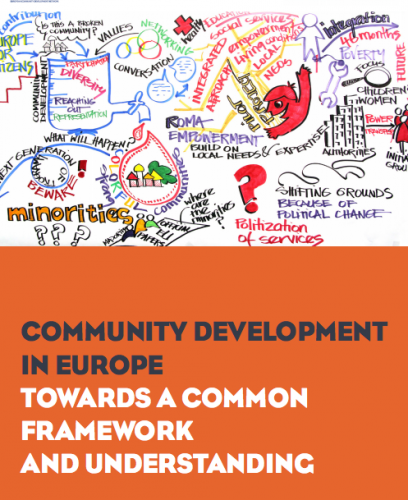Combined European Bureau for Social Development was founded in Swansea 1990. The aim was to facilitate joint projects and applications in the European context and to organize more systematic exchanges between national community work organizations and to promote community development on a European level. From 3 members in the start CEBSD has gradually grown to an independent European NGO with 11 member organizations. In 2011, we changed our name to the European Community Development Network in light of the growth in recognition and understanding of community development and the concern of the Network to focus specifically on community development as a means of intervention for social justice and inclusion.
In 2004 CEBSD´s and CEBSD Hungarian partner “Hungarian Association for Community Development” together with “The International Association for Community Development organised a conference on “Building Civil Society in Europe through Community Development.” The conference was attended by representatives from 33 countries resulting in the Budapest Declaration – a building stone for CEBSD’s work. As a manifesto statement, the Budapest Declaration reflects community development principles and their application in work with rural and urban communities and on specific issues affecting not just geographical communities but also communities of identity or interest.
This project builds on that manifesto, bringing to life the specific goals of community development, processes through which it happens, tools we use and outcomes delivered. In our view the framework which was developed through processes of reflective dialogue and engagement in eleven countries, offers, a comprehensive reference for good community development work, applicable to the countries represented in EuCDN and beyond. Finally we wish to express our deep appreciation to Magda Tancau for all her work in coordinating this project. We also acknowledge with gratitude the European Commission for funding to support this work and we are hopeful it will be of value to anyone interested in collective work to address social, economic and environmental concerns.
Download the report
Table of Contents:
| Introduction | |
| Community Development in Europe: Shared Language, Shared Purpose, Collective Impact | |
| A Common Framework for Community Development | |
| Community development practice in eleven European countries | |
| • | Oslo, Norway: Democracy Not Only for the Initiated |
| • | Prague, Czech Republic: Public participation in the process of reconstruction of courtyards |
| • | Barcelona, Catalunya: Promoting social and economic solidarity in local community development |
| • | Miskolc, Eastern Hungary: Mobilizing community action in a block of flats |
| • | Czestochowa, Poland: Reactivating Limanowski Street |
| • | Plovdiv, Bulgaria: Improving Roma livelihoods |
| • | Edinburgh, Scotland: Growing Healthy Community Assets |
| • | Facaeni, Romania: Local culture and traditions and community development |
| • | Ireland: From Private Homes to Public Action: The Domestic Workers Action Group |
| • | West Flanders, Belgium: Caring Networks |
| • | Orebro, Sweden: Managing money: challenging poverty |
| Conclusion | |





